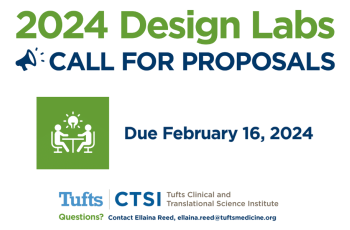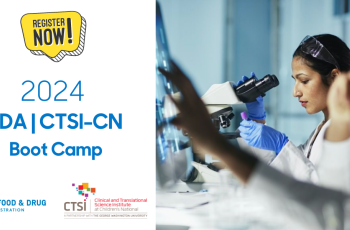The mission of the Clinical and Translational Science Institute at Children’s National (CTSI-CN), a partnership between Children’s National Hospital and the George Washington University, is to foster broad collaborative investigation that accelerates discovery (from bench to bedside and community), and strives to improve health and health equity through clinical and translational research (CTR). In the present case, health equity is a goal in which CTR cohorts truly reflect the population of persons affected by a given condition.
Funds and support are available for “shovel-ready” projects aimed at translating discovery to improved health, with special attention to issues related to achieving health equity. This opportunity has a quick turnaround and limited funding period (~4.5 months), therefore projects should be designed to utilize existing data and/or resources, including biorepositories, to positively impact decision-making by healthcare professionals, patients, parents, and the communities served by our institutions. Qualitative or focus group studies that can be completed within the short timeline of this award would also be acceptable. To be eligible, projects must focus on at least one of 6 special interest areas outlined below:
- Using existing data sets to define demographics and/or factors to include in future studies that will result in a study population that authentically represents the appropriate burden(s) of a disease of interest.
- Re-analysis of data with machine learning and/or artificial intelligence approaches that might help to predict the influence of social or environmental factors on health, or development or progression of disease.
- Expanded analysis (either by scope or technique) of existing biorepositories (tumor banks, pathology specimens, blood/blood components) to increase representation of understudied populations that are relevant to the disease that forms the basis for the biorepository, or to reveal new diagnostic or therapeutic targets that may benefit affected subpopulations (e.g. precision medicine).
- Re-analysis of data or biological samples from studies of rare disease(s), with special attention to evaluating the selective impact or mechanisms of the disease in previously overlooked special populations, or subgroups of patients that may be particularly vulnerable to the disease.
- Qualitative and/or focus group studies aimed at increasing the participation of under-represented groups in biomedical research in impactful ways, for example, to increase representation of a group particularly affected by the disease.
- Qualitative and/or focus groups to obtain the perspectives of patients, families, and/or communities about regional health burdens and/or challenges in identifying and resolving health issues that affect the community.
Apply by December 1, 2021, 5:00pm.
Save the date! Information Session on Monday, November 8, 2021, 11am.


